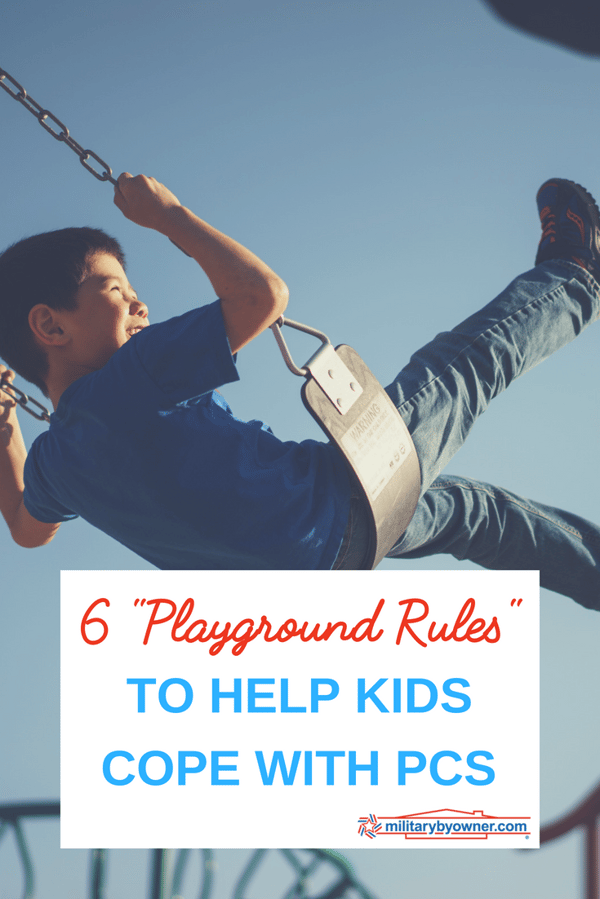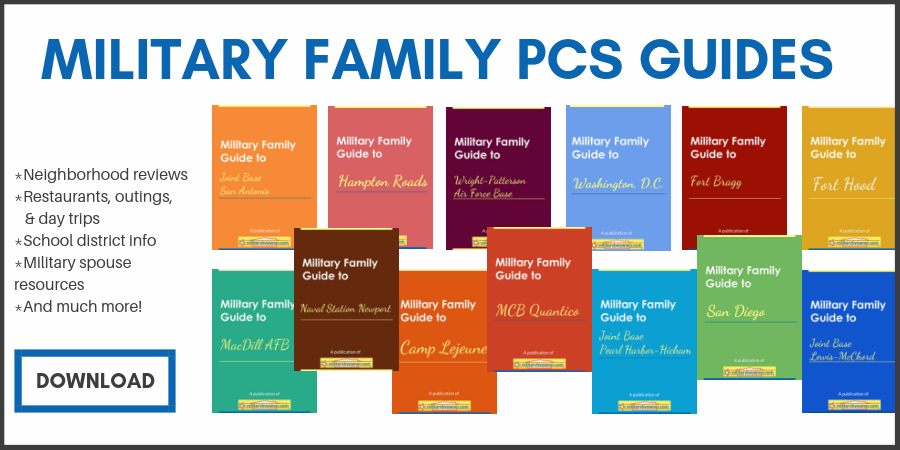6 Playground Rules to Help Kids Cope During PCS
Permanent Change of Station (PCS) moves are sometimes incredibly hard, but they can be especially hard on our littlest movers. Much like dragging a child out of a candy store or off the playground, any member of the family could be resistant, or even downright defiant, when it comes to leaving a duty station (or friends, sports teams, or neighborhood) that they love.
So how do we help our kids during this adjustment? Going back to the playground metaphor may shed some light on coping techniques - for both kids and adults alike!

When my children were very little, I’m talking the tantrum-prone toddler years, we had a practice for circumventing the I-don’t-want-to-leave-this-fun-place meltdowns. I’d give the customary five-minute warning, but then I would encourage them to savor their last slide, last go-round on the spinny-thing, and last four pushes on the swing. Ideally, a playmate would also be departing at the same time so parents could “roll with each other’s momentum.” Then I would encourage my kids to say, “Goodbye park! Thanks for being so fun!” On the way to the car, I’d ask them to tell me their favorite thing about playing at the park. I would ask them if they made any new friends or enjoyed playing with Bobby or Sarah. In the car, as we were driving away—still in sight of the continued fun happening on the playground—I would ask them to recount three fun or favorite things about the park. As we pulled away, the slides faded into the rearview mirror and the kids were either already snoozing from the exertion of the day or contented with the memories of it.
In no way am I declaring that our family was immune to the fit-pitching episodes of Exorcist caliber because we were not. However, this practice proved successful in avoiding a not-so-fun ending to our outings more often than not. We’ve subconsciously adopted this model for a wide range of scenarios, but it’s notably applicable for a PCS.
1) Agency in the Leaving
Communicating with your children about the move is critical so that they feel involved and like they have a voice. Clearly, they don’t have any more say in the matter than we do, but allowing them to seemingly make their own choice about leaving will help them maintain their resolve about it. Goodbye park can easily become Goodbye bedroom, house, and neighborhood. I once read in a parenting book that kids need a graceful exit, but sometimes just can’t find one on their own. By providing the language and modeling the process of saying goodbye, they can find their will to leave without protest. By granting the kids some agency in the leaving, they didn’t feel like they were just being yanked out of a fun environment. Rather, they feel like they exiting on their own accord.
2) Roll with the Momentum
One unexpected PCS silver lining to be found is that often, several families will be moving at the same time. Having someone to commiserate with is helpful for adults, but kids can benefit from the group experience as well. If your child has a friend who is also moving away, have them chat about how they’re feeling about it and how they’re preparing. Maybe they can “compare notes” on whatever level they’re on. This will help them feel like they’re going through something hard alongside someone else because they are! You’d be surprised how early kids pick up on the importance of a shared experience.
3) Gratitude
Being grateful for the things you love about your current home will help maintain a positive mindset throughout the PCS process. I know, easier said than done when you’re consumed with logistics and research for your upcoming duty station! But, instead of getting preoccupied with any apprehensions you have about what the future holds or sadness about leaving, reframing your experience to honor the positives will help with your outlook. This is another thing we have to sometimes provide the example for with our little ones, but if you can identify the favorite parts of your current duty station, you’ll be able to savor them just a little longer instead of missing them so badly when you leave.
4) Reflect on Friendships
Similar to the gratitude practice, it’s a wonderful habit to honor your present friendships. Who do you know now that you didn’t before? What relationships will you cherish from here on out? And how fortunate we are to have the opportunity time and time again to forge new relationships with each move. Recently, during a non-PCS year, my seven-year-old asked me if we were moving. When I told her no, we’re staying put for now, she was saddened. She said to me that she would love to move again because with each move she makes soooo many more new friends! It’s cumulative, not sacrificial.
5) Honor all the Emotions
After several years of geographic stability, we were ordered to move across the country. This was our first PCS with children and we had an almost-four-year-old and an 18-month-old. The baby was unphased, but our daughter had a much harder time. I was sad to leave my life behind and got a little too consumed with the apprehension and fear of what lay ahead. I wanted to be transparent and let her know that it was ok to be sad, but I spent a little too much time in that space. I forgot to encourage her to be excited, to anticipate. No matter what your kids are feeling, or whether or not it matches up with what you’re experiencing, be sure to make space for all of it.
6) Orient to the Future
Being sad about leaving the park doesn’t make the next trip to the park come any sooner. I actually used to tell my littles that I’d think twice about bringing them next time if this is how they act when it’s time to go home. Cruel, I know. But there’s truth there. Sometimes, it takes a conscious effort to move beyond our immediate discomfort and look forward to new experiences. We do have the opportunity as parents to work on intentionally orienting our kids’ focus towards the adventures yet to come versus the stress of the present or longing for the past.
Frequent PCS’ing can make even the most composed military parents want to throw a tantrum from time to time, but let’s learn from the lessons we teach our littles. Helping them cope and adjust during a transition will also affect our own well-being during this time where maybe all we want to do is stay on the swings with our friends.




